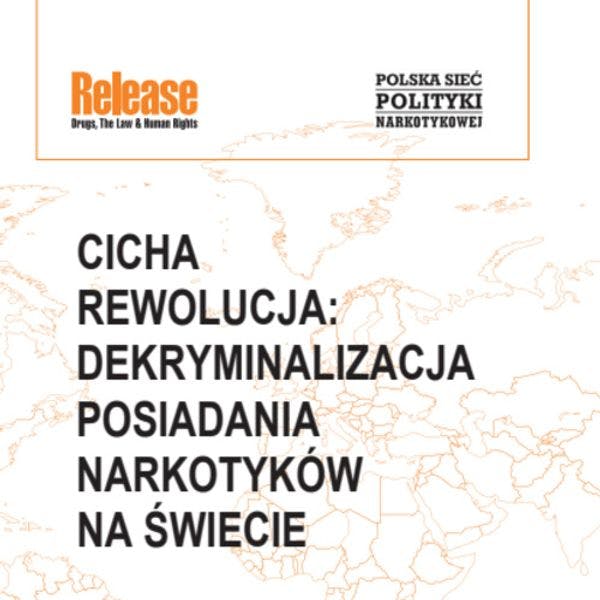"Drugs decriminalisation becomes a reality around the world"- Press conference in Polish Parliament
Let us better make rational drug laws!
On Monday, March 31, 2014, a press conference "Drugs decriminalization becomes a reality around the world" took place in the Polish Parliament. During the conference, the report "A quiet revolution: drug decriminalization policies in practice across the globe" was presented for the first time in Poland. This report, prepared and published by a British organization Release, accurately describes changes in drug policy that have occurred in recent years, including issues on legalization of drugs and departing from punishment for their possession (the report is available here).
The conference was attended by Ryszard Kalisz, member of the Polish Parliament, Tomasz Lipiński, musician, Piotr Kładoczny, lawyer of the Helsinki Foundation for Human Rights, Paweł Siłakowski, addiction therapist, and Maja Ruszpel from The Polish Drug Policy Network.
The conference participants mainly discussed the existing drug law provisions in our country.
“The current drug law in Poland, even though the amendment was adopted in 2011, is one of the most restrictive in the world,” Ryszard Kalisz said. “The countries that conduct rational drug policy, drugs, both soft and hard, should be decriminalized,” he emphasized.
Kalisz mentioned that decriminalization had been introduced in the Czech Republic in 2010, Estonia in 2002 and Portugal in 2001. He also discussed the changes in Uruguay and in the State of Colorado in the U.S.A., where the sale and consumption of marijuana had been legalized.
In Poland, however, any person who has a small amount of illegal substance for personal use is punishable by imprisonment up to 3 years. This problem was not solved by the amendment of 2011 which allowed the prosecutor to withdraw from the prosecution in case of possession of small amounts of drugs for personal use.
“It turned out that today, we have a crisis of prosecution, as prosecutors are afraid,” Ryszard Kalisz said. “If for a whole province, there is only a dozen of decisions of discontinuation, it means that the prosecutor prefers to prepare an indictment to ensure easy conviction as a success, rather than terminate the case,” he stressed.
The reason for such a situation is in fact the lack of drug amount reference tables to define precisely what is an "insignificant" amount of drugs possessed for personal use. These tables are successfully used in many European countries. Based on the drug amount, they specify whether the drug possession is a crime or only a misdemeanor (sample reference tables can be found in the report). However in Poland, such a tool, although needed, does not exist.
“We visited a number of prosecutors' offices, and all prosecutors would tell us: please prepare specific standards, rules that identify what is an insignificant amount, for every substance,” Dr. Piotr Kładoczny said.
A special guest of the conference, musician and artist previously associated with bands TILT and Brygada Kryzys, Tomasz Lipiński stressed that the current drug laws in Poland had been created based on the myths and uperstitions.
“Superstition is the understanding that drugs is something that concerns the social margins or very young people who aspire towards the margin. This is not true. Today, in the second decade of the 21st century, the drug is something that every young person comes in contact with everywhere in Poland. If this is true, the young people who grow up must be ready for it. Does the current law prepare them? No, it doesn't. It is to frighten them, and it fails to frighten, because you cannot educate anyone by fear,” Lipinski said.
Paweł Siłakowski, addiction therapist, added: "The situation of punishment for psychoactive substances caused something that was to be expected. Namely, a number of substances, which in themselves are legal, appeared on the market. And - worst of all - these are substances that can be also bought legally," he referred in this way to the phenomenon of designer drugs and other similar substances.
"Let us make drug law that is based on the lessons learned so far," Tomasz Lipiński said. "Dear MPs, please stop acting based on myths when you create the law, start working lead by knowledge and wisdom".
In the concluding part of the conference, Maja Ruszpel of the Polish Drug Policy Network provided statistical data that showed the effect of the current drug law: "In Poland, every three minutes someone is being detained on suspicion of possessing illicit psychoactive substances. Annually, there are 30,000 of them, and the majority are not criminals but young people experimenting with drugs or addicts. Such ineffective law generates costs amounting to 80 million Polish zlotys every year.
Streaming of the debate available herein Polish.
Download the report in Polish here.
This press conference aimed at raising awareness of the different models of decriminalisation developed around the world and how these could be adapted in Poland.
Keep up-to-date with drug policy developments by subscribing to the IDPC Monthly Alert.
